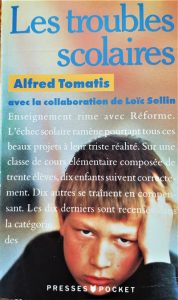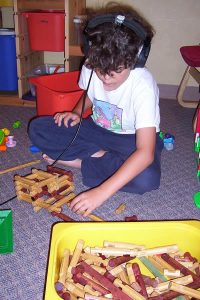
School Troubles, A. Tomatis, 1992
Have You Noticed You Or Your Child Struggling To Focus On Simple Tasks?
Does your child have trouble sitting still? Have teachers expressed concerns about their study habits? Do you have to remind them constantly to complete their chores?
You might be concerned because your child is hyperactive and never seems to slow down. Perhaps they have difficulty finishing homework on time or listening during school. Maybe these problems spill into the home, where they struggle to focus on the instructions you give them, causing frustration for both of you.
ADHD Isn’t Just A Childhood Disorder
Maybe you notice some of these same symptoms in yourself. Perhaps inattentiveness, impulsiveness, or emotional outbursts have strained your career or relationships, and you’re not sure how to handle the symptoms anymore.
Attention Deficit Hyperactivity Disorder, commonly known as ADHD, is a neurodevelopmental disorder that doesn’t disappear as you grow up. ADHD can be just as challenging for adults as it is in childhood. But it doesn’t always have to be a struggle. With therapy designed for ADHD, you can find an avenue to help your child—or yourself—listen, focus, and thrive.
ADHD Is A Common Issue For Children And Adults

If you or your child is dealing with an ADHD diagnosis, you’re not alone. Differences in human attention have been noted in historical documents as early as the 1700s, and the formal diagnosis has been around since the 1960s. Studies show that up to 9.8 percent of 3-17 years old are diagnosed. People with the disorder may also have other conditions, including anxiety, depression, autism, or Tourettes¹.
The impact of ADHD can be seen across a lifetime. The symptoms may change as people age and develop coping mechanisms, but up to 60 percent of adults diagnosed with ADHD in childhood will continue to seek treatment².
Sensory Difficulties Can Play A Part In ADHD Symptoms
As we learn more about ADHD, we are also learning that there is a correlation with sensory difficulties, like issues processing stimuli. Having ADHD might predict sensory problems³ or other developmental disorders, like auditory processing disorder⁴. Research suggests there is a connection between ADHD and sensory perception difficulties.
According to Dr. Alfred Tomatis, our listening abilities begin developing in the womb as we listen to our mother’s voice and learn its inflections, rhythms, and tones. Once we’re born, we develop the cognitive listening abilities we need in everyday life. However, the development of our listening abilities can be disrupted by things like ear infections, emotional distress, or sensory deprivation.
The good news is, it’s never too late to rectify your listening problems. Auditory therapy works for children, teenagers, and even adults. Treatment for your auditory issues can help alleviate your ADHD symptoms.
Auditory Therapy Can Make A Difference For ADHD

Because sensory perception can play a major role in ADHD, I’ve created a systematic approach that focuses on training the part of your brain that processes sound. My program involves a three-step process to help determine your or your child’s needs—whether you have ADHD, auditory process disorder, or both—and help you retrain your brain so you can function and prosper.
Over the course of 25 years, I worked with ADHD and auditory processing issues and researched the connections between them. I even did my doctoral dissertation on how auditory processing plays a key role in optimizing attention for those with ADHD. I have dedicated my life to studying these connections and working with individuals with listening challenges, so you can rest assured that I’m here to help you find treatment and a path forward to ease your symptoms.
What To Expect
Before we dive into treatment, we will schedule an evaluation to determine the origin of the difficulties you or your child are facing. This initial evaluation is how I determine what your treatment plan should look like. (If the evaluation determines auditory processing dysfunction isn’t part of your issue, then I will refer you to a provider who can address your individual needs.)
After the evaluation, we move on to sound training. The goal of sound training is to help the brain focus better on listening, discriminating between sounds, and paying attention. As we move through the program, I will evaluate your progress until your skills are sharpened and at the level they need to be.
Individualized Therapy To Improve Your ADHD Symptoms
Sound therapy isn’t a cookie-cutter approach. The evaluation and treatment process is individualized to your brain and your specific challenges. By targeting your or your child’s unique needs, I can help you ease your symptoms and realize your full potential.
Therapy isn’t only about sound training. I also teach you and your family real-world strategies and skills you can take far beyond the office. For example, I can help you learn to keep track of information during work meetings or help your child learn ways to keep things organized at school. Each strategy is designed just for you to give you the best chance at success.
Managing ADHD can be difficult for adults and children alike, especially when traditional therapy isn’t sufficient. With the addition of Alfred Tomatis’ sound-based techniques, you or your child can address the root causes of your symptoms and realize your full potential.
You May Still Have Concerns About ADHD Therapy…
How can you treat a disorder with music?
Many people use music to help them focus. In fact, it’s often used in a classroom setting to help calm children and encourage learning. Music has even been shown to improve the performance of children with ADHD in learning-related tasks⁵.
I’ve also done research investigating attention, processing speed, phonemic decoding efficiency, behavior outcomes, and brain electrophysiology changes that show the Tomatis Method of Sound Stimulation is effective for people who have ADHD⁶.
Why not medication?
Medication can be a great treatment for children and adults who have ADHD. In fact, some patients who go through my program are also on medication through a psychiatrist or other practitioner who has experience in treating ADHD.
However, medication doesn’t address sensory inputs and auditory processing like my program. With auditory therapy, you can train various cognitive and attentional parameters that you might need to further develop your focus and attention.
I don’t think I or my child can change.
The brain is incredibly malleable at all ages. By making thorough evaluations and taking standardized measurements, I develop an ADHD treatment plan that works best for you or your child. The changes will be subtle at first, but we can measure them to show that it can gradually help you and your child not only manage ADHD symptoms but make changes in the ability to process and attend to tasks—whether in the classroom, at work, or at home.
I don’t want to deal with a long, drawn-out process.
I understand that this is something that’s not doable for everyone. That’s why I try to work with you to come up with a plan that’s best suited for you and your family. If something feels overwhelming, we can re-evaluate and focus on what is relevant and easiest for you. Our intervention process is rather short but intensive, so you don’t have to worry about spending a long time in therapy.
You Can Shed The Weight Of ADHD With Auditory Processing Therapy
If you’re ready to take the next step, please call the Dr. Sacarin Listening Center at 206-522-8873 for a free, 30-minute consultation. Together, we can help you and your child develop listening skills and succeed.
¹ https://www.cdc.gov/ncbddd/adhd/data.html
² https://www.ncbi.nlm.nih.gov/pmc/articles/PMC2957278/
³ https://www.sciencedirect.com/science/article/abs/pii/S0010440X17302365
⁴ https://journals.lww.com/ear-hearing/Fulltext/2018/01000/Same_or_Different___The_Overlap_Between_Children.1.aspx
⁵ https://www.frontiersin.org/articles/10.3389/fpsyt.2015.00127/full
⁶ https://www.proquest.com/openview/8be5e40124d8f330cd87d1a221f54fd7/1?pq-origsite=gscholar&cbl=18750
